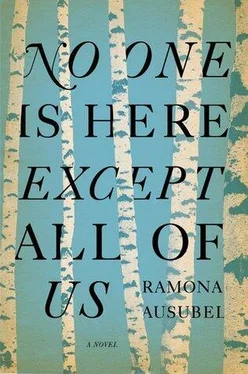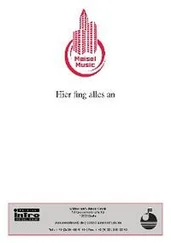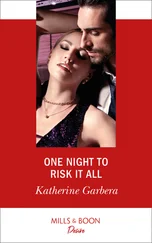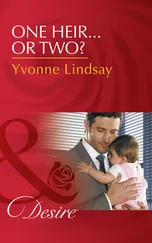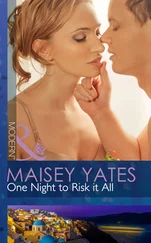“Isn’t it a wreck?” Hersh had asked.
“It’s in surprisingly good shape,” Vlad had told him.
It was a clean, dry, square room with a stove and a wash bin. I looked around at the little place. Someone had lain a woven rug down, and there was a rocking chair. This was the second time since the world began that I was going to sleep as part of a new family. Without asking if he should, Igor made me a cup of tea. I wondered if he knew that, as the wife, I was supposed to be the boiler of water. But he was a boy with a mother who knew how to ask for what she wanted. If I was smart, I might be able to make a few requests, rather than dancing only the steps I was taught. We sat on the floor because neither of us wanted to take the one chair. We looked out at the rain. The dancing feet, the applause, our own celebration, was too far away for us to hear. The world was empty of any sounds but our own.
Igor touched my hand. “Do you like chocolate?” he asked.
“Sure,” I said.
“Me too. Do you like hot milk?”
“I’ve never had it.”
“Never?”
I shook my head. “Do you like cabbage?” I asked.
“Yes, of course,” he answered, which made me feel safer. “Do you know what we are supposed to do now?” he asked.
“We are supposed to be married. You are the husband and I am the wife.” He laid a sheet down over the rug, laid himself down, and asked me to join him. I sat there, and it felt like a strange picnic. Igor pulled me to him. We were side by side, and close.
“How old are you?” I asked while Igor touched the smooth ridge of my arm.
“I’m fifteen,” Igor said. “How old are you?”
“I don’t know,” I told him.
“You don’t know?”
“First I was nearly twelve, then I was someone’s new little baby, then I was married.” My voice sounded very far away. A speck in the huge silence of the night.
“You can be my age if you want,” he whispered. He put his palm out to me, open, as if it contained the thing I needed to be grown. I lowered my face into that cup and lapped.
“Thank you,” I said, and kissed him on the forehead, as if he were my child, while I tried to hide my tears of relief. He kissed me on the forehead as if I were his child too, as if we were each other’s. “I would like that very much,” I said. In the morning we would open many wedding gifts, but this was the only one I would remember.
“We could even have the same birthday, if you want, so it’s easier to keep track.”
And as a new couple with our matching ages and matching birthdays, Igor and I kissed badly and wetly and sweetly all over our young faces to the call of an owl outside asking the question again and again, “Who? Who?” to which we tried the answer, “Us, Us.”
Ido not wonder so much why we were left alone as long as we were. Why our village was skipped by marching Romanian soldiers with orders to send all the Jews and Gypsies to the other side of the border for the Germans to deal with. What aches in every part of my body is that we did not hear their cries, the lives ending. Death by machine gun, death by starvation, death by sadness. Along we went, our lives day to day, morning to night. A million mothers, a million fathers, a million sons and daughters screamed at once, and all we heard was the good wind shake the trees out.
The villagers gathered under umbrellas in that clean, glassy air outside my door and waited to meet the first baby, the real first baby, in the whole world. Dawn sprawled out across the sky, a woman waking up. Inside, I howled and the healer let a slow river of encouragement wash me down. Pacing from oak tree to rain barrel, Igor beat a nervous path in front of the house. He looked determined to get where he was going, which was nowhere. His father stood in his way, but Igor made a detour and persevered. The stranger coaxed him quiet, saying, “The baby will find his place. Trust him.”
“And Lena?”
“She is finding her place, too.”
Up and back and back and up he marched, the soggy grass under his feet trampled. The villagers watched Igor clear a path, counting off his wait for fatherhood. This made Perl dizzy, so she approached Igor, the husband of her daughter-niece, with a big bag of birdseed. She reached inside and flung the handful out to show him. From the oak tree, two ravens came to investigate the seeds. Their black was almost blue, their eyes like polished amber. Perl tossed another handful and the ravens pecked the ground. Igor looked at Perl, his own eyes big and hollow. “She’s going to be fine,” Perl said.
“What have I done to her?” he asked. In his hand, the seeds were smooth and light. They made a very faint splash on the ground and floated on the surface of a puddle. A sparrow ate what Igor offered. Squirrels, their claws ticking, climbed down from the tree.
In the hours while I worked to introduce the baby to the world outside my body, Igor drew all the creatures to him. Jays, magpies, starlings and sparrows. Woodpeckers, wrens and swallows. Pigeons. He was surrounded, an island in a sea of feathers. They flapped at each other, fought for his kind attention, followed the arc of his arm. Birds stood on Igor’s shoes, they brushed him with their wings. They beat the air back, dove, squawked. The man disappeared inside the flock. Igor had become a seed-giving tree, a nest. Through the wings, the villagers could see Igor’s smile.
Nothing winged tried to carry me away. I was vaguely aware of the wet cloths Kayla swept over my forehead, saying, “Oh, dear, oh dear,” unable to hide her surprise at the pain I was in. Water dripped down my cheeks, or was it sweat, or blood, or rain? I could not remember if I was indoors or out, if I was held by loam and shaded by tall pines, or a child in my first home, weak with fever.
“Where am I?” I asked.
“You are home. You are having my grandchild,” Kayla said, impatiently. In the next wave of pain I wondered if she was talking about me — was I myself about to be born?
The weeks and months that had passed since Igor and I were married floated past me like clouds. The first morning: boiling two eggs, browning two pieces of bread, Igor talking about his mother. He hummed the song she used to sing him before she had moved on to the next baby and left him songless.
The day Igor came home from working at the bank and looked like he was bursting: “Is something wrong?” I asked.
“I had a whole day, and I want you to know about it. I missed you.”
“Tell me,” I said, and, beginning from the moment he opened his eyes until the moment he walked in the door, he did. There was no climax, no event to speak of, but he had lived it, and I had not.
“It doesn’t seem fair,” Igor said, “that I can’t be in your head and you can’t be in mine.” He asked me to tell him what it had felt like to split the potatoes with my knife. What it had smelled like when they had first begun to soften.
I remembered the night we took our clothes off and tried various configurations: I felt bald and blind in the dark, but our bodies, still equipped with the full memory of our species, guided us through. I had expected this to feel very grown-up, maybe even a test of whether I was such a person. It did not. It felt like being ageless, just a slippery combination of limbs and instincts, neither young nor old. We laughed after, for hardly any reason at all.
One afternoon, thunder cracking outside: at the table, I laid napkins, spoons and bowls for Kayla and Hersh, Igor and myself. We lit a candle, we said an old prayer. The conversation was simple — the everyday of our lives. They were at my table, and they could not change the rules here. Kayla did not and could not ask me to sit on her lap. Even her suggestion that next time I add more marjoram to the soup was met with a scold from Hersh. “I think it’s just wonderful,” he said. “It’s your own recipe.”
Читать дальше
